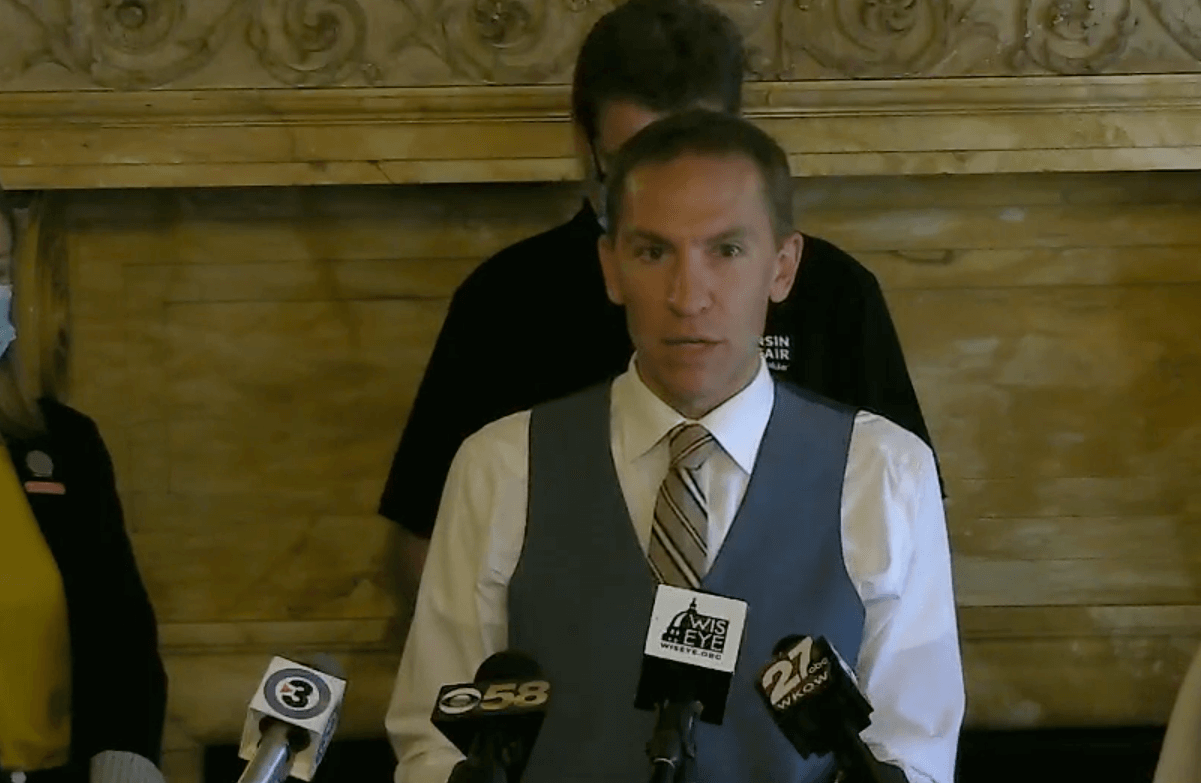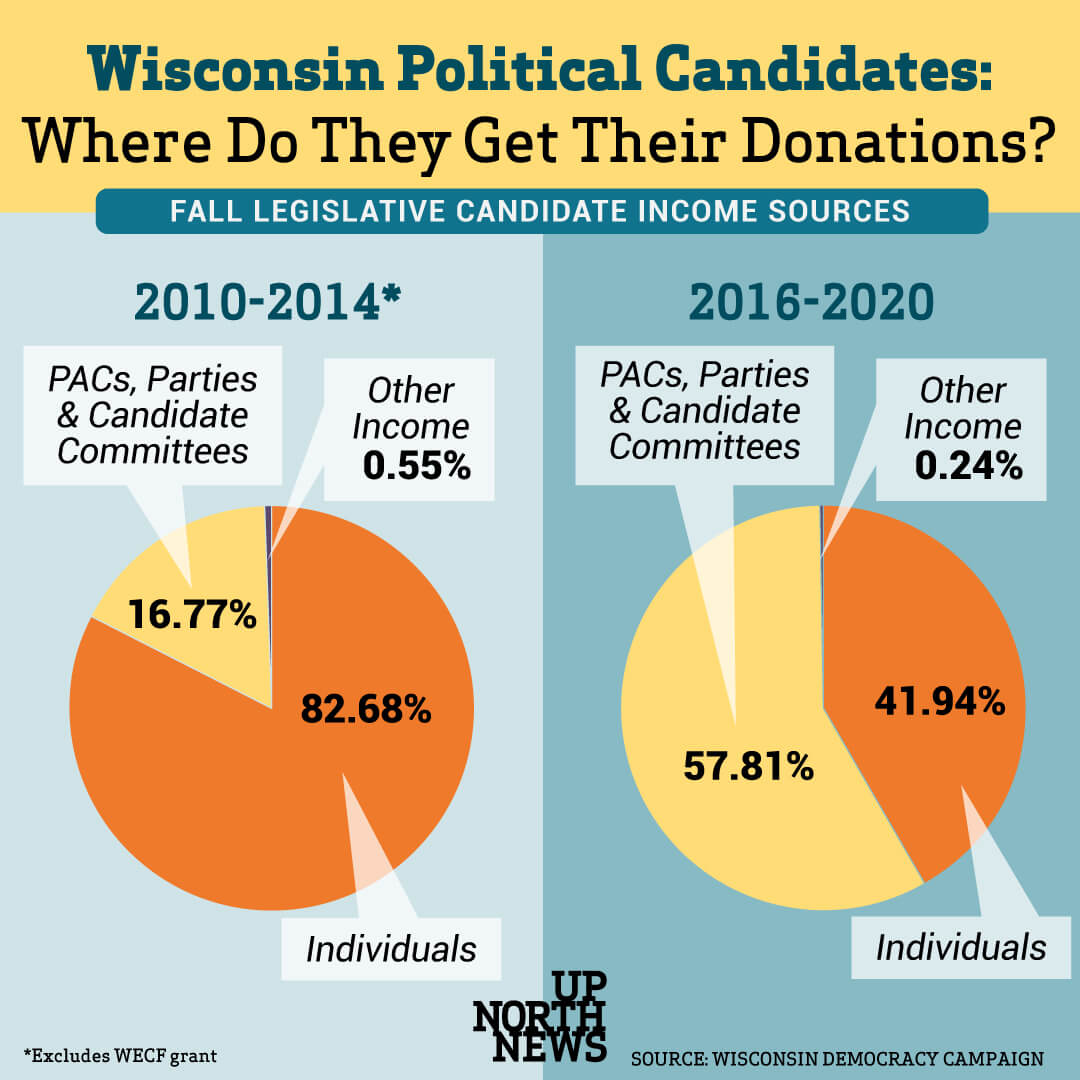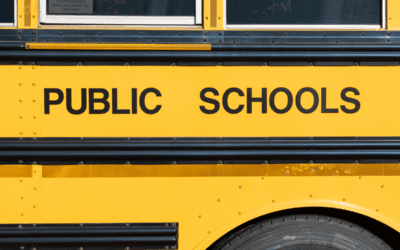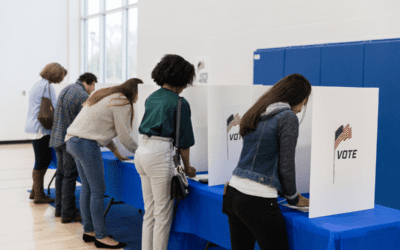
#image_title
Seven-bill offering, called the “Campaign Integrity” package, would reform campaign finance laws in Wisconsin.
A group of Democratic legislators and voting rights advocates on Tuesday announced a package of bills in Madison aimed at promoting accountability, transparency, and integrity in political campaigns.
Broadly, the bills—dubbed the “Campaign Integrity” package—would reform state campaign finance laws by lowering campaign contribution limits and restricting special interest groups’ and corporations’ ability to influence elections.
Democratic state Sens. Chris Larson and Tim Carpenter of Milwaukee, and Melissa Agard of Madison; and Reps. Lisa Subeck of Madison, Jonathan Brostoff of Milwaukee, and Deb Andraca of Whitefish Bay introduced the bills. Matt Rothschild of the Wisconsin Democracy Campaign and George Penn of Wisconsin United to Amend, a campaign finance reform advocacy group, joined the legislators in a press conference to introduce the bills.
“There’s a lot of problems with the amount of money that’s being spent on elections, and we are seeking today to try and curtail some of that and shed some much-needed sunshine where it is necessary,” Larson said at the press conference.
In a press release introducing the seven-bill package, Larson said “continuing to allow powerful special interest groups to have a stranglehold on Wisconsin elections, is a betrayal of our democracy and our shared interests.” Agard introduced a bill to lower contribution limits in numerous ways, including changing the limit of individual donations for statewide elections from $20,000 to $10,000.
“Unlimited contributions lead us down a path where the wealthy and well-connected have seats at the table that you and I and the ordinary people of WI don’t have,” Agard said.
Carpenter said another bill would make donors who give more than $100 register with the Wisconsin Election Commission and make candidates disclose information about their PAC (political action committee) donations to the public.
“If wealthy donors want to spend their money in campaigns in the marketplace of ideas, they need to do it publicly,” Carpenter said. From 2010-2014, 16.7% of campaign contributions in Wisconsin came from PACs, but in 2016-2020, that number rose to 57.8%, according to the Wisconsin Democracy Campaign.

Two more bills would address “a loophole that a semi could drive through” in campaign financing, according to Brostoff.
These two pieces of legislation would not allow unchecked campaign expenditures that circumvent current campaign donation limits and would close the segregated fund loophole that funnels additional money to political committees.
Larson introduced a bill to disincentivize corporations from funneling large donations through individual donors. Current law requires donors to report their occupation if they give $200 or more, but Larson would lower this number to $100 in an effort to fight corporations’ use of so-called straw donors.
“Knowing a contributor’s employer is crucial to transparency and accountability,” he said.
Another act would require political groups that distribute mass communications like advertisements to report donors of over $100 that fund this communication.
“Those with the most money have the biggest megaphone and can drown out those who can’t afford to pay for speech,” Subeck said.
RELATED: Breaking Down Democrats’ Crowded 2022 Senate Field in Wisconsin
Many of the legislators referenced the 2010 US Supreme Court decision in Citizens United v. FEC that changed campaign finance laws at the federal level, ruling that under the First Amendment, corporations, special interests, and other outside groups can spend a limitless amount of money on elections. The decision greatly expanded outside groups’ influence in American elections. Subeck and Penn expressed their support for a statewide referendum that could undo this decision, which would be covered under one of the bills.
Penn said 166 communities in the state have already passed resolutions calling on the State Legislature to get big money out of politics.
“Corporations and those with means have undue influence in our campaigns and elections. They do this through dark money expenditures where nobody even knows who’s paying for them, and all of that adds up to politicians who are bought and paid for by special interest,” Subeck said.

Opinion: Empowering educators: A call for negotiation rights in Wisconsin
This week marks “Public Schools Week,” highlighting the dedication of teachers, paras, custodians, secretaries and others who collaborate with...

Opinion: The Affordable Care Act saved my life and this is why we have to protect it
The day I turned 26, I didn't give the birthday much thought. It wasn’t a landmark birthday—until it became the birthday that changed my life. On my...

Not just abortion: IVF ruling next phase in the right’s war on reproductive freedom
Nearly two years after the US Supreme Court overturned Roe v. Wade, another court is using that ruling to go after one of the anti-abortion right’s...

Opinion: Students and educators need us now more than ever. This Public Schools Week, commit to celebrating and advocating for them all year long
In this op-ed, Tessa Maglio with Wisconsin Public Education Network highlights Public Schools Week and how to support our schools, educators, and...




